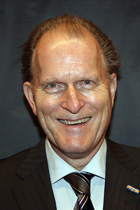Wouter van Beek
 Most of his academic career Wouter van Beek worked at the Department of Cultural Anthropology at Utrecht University, as one of the Africanists at that institution. In 2001 his research became part of the African Studies Centre Leiden.
Most of his academic career Wouter van Beek worked at the Department of Cultural Anthropology at Utrecht University, as one of the Africanists at that institution. In 2001 his research became part of the African Studies Centre Leiden.North Cameroon has been the place of study for his PhD work, from 1972. The ethnography of the Mandara Mountains, in particular the Kapsiki/Higi, forms a permanent element in his work. He recently published his 7th book on the Kapsiki, a collection of folktales (Contes nouveaux des Kapsiki). His main books are on Kapsiki religion (The Dancing Dead), blacksmiths (The Forge and the Funeral) and the dynamics of orality (The Transmission of Kapsiki Folktales).
From 1979 onwards the Dogon of Central Mali form his second focus of research: their religion, including their masquerades, and their cultural heritage have resulted in a number of publications and co-produced films. At present a huge song cycle at the heart of the Dogon funeral rites, forms the pivot of a project called DigiDogon, part of the Joint Program on digitalization of cultural heritage (JPICH). This project entails new research in the Dogon area by four junior researchers, three of which are Dogon themselves. The first book publication, Chanter le baja ni. Abirè le Voyant Dogon is out.
From 1996 onwards Wouter van Beek became involved with Southern Africa, both with Namibia and South Africa. Participation in academic cooperation between the Netherlands and South Africa resulted in tutoring South African PhD candidates, and in two projects, on witchcraft accusations and on Holy Places, together with Tilburg University, as well as in a series of publications.
In 2007 Wouter became Professor of Anthropology of Religion at Tilburg University (part time), where he taught various courses till his emeritate in 2015.
He is a regular teacher for the HOVO (Higher Education for Seniors) at the universities of Leiden, Utrecht and Tilburg, in a variety of lecture courses.
Keywords: Kapsiki-Higi, Dogon, religion, anthropology of religion, tourism, cultural heritage, African masks, performance, cultural ecology, folk tales, oral history.

